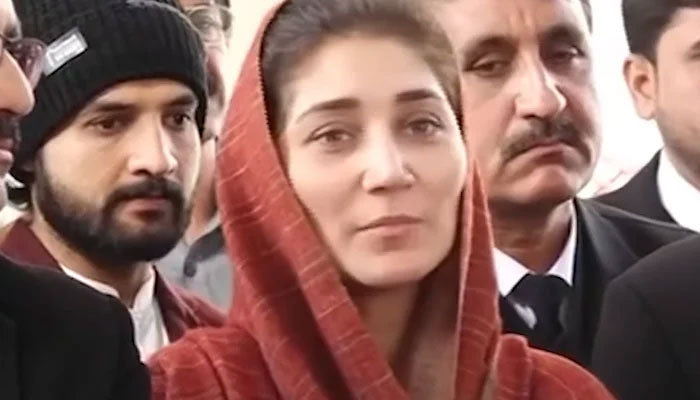What are legal remedies for election irregularities?
Mehrbano Qureshi, an independent candidate from Multan while expressing her concerns over the election result
ISLAMABAD: What are the legal remedies and how much time does it take to redress the grievances? This question has emerged after some independent candidates from Pakistan Tehreek-e-Insaf (PTI), who have lost in the general elections 2024, have leveled rigging allegations.
Mehrbano Qureshi, an independent candidate from Multan while expressing her concerns over the election result, claimed that more than 16,000 votes have been rejected in her constituency. Whereas, she claimed she was not allowed to enter the premises of returning officer at the time of compilation of Form 47.
The question here arises under what law such election irregularities can be challenged and how much time it takes to get relief. The aggrieved candidate can file a petition in the Election Tribunal under Section 139 and 142 if he/she believes the election was conducted unfairly, illegally or in violation of electoral laws. However, the petition must be filed within 45 days of the publication of election result.
Before filing the petition, the applicant must gather evidence to support the allegations. The evidence can be video clips, witness statements or any other documents. Although, some PTI candidates have leveled rigging and irregularities allegations, the question arises whether they have any evidence for these claims. Whether they have any documentary or any other evidence to prove their claims under Election Act 2017. Has any such evidence been presented in the media so far?
Under Section 144 of the Election Act 2017, the complainant must present a statement of fact and other material evidence to prove the alleged irregularities in the election.
The election tribunals, after concluding the hearing, can declare the election null and void, order a re-election or declare the petitioner as the winner of the election under Section 154 of the Election Act 2017.
In the recent past, the election tribunal declared former Deputy Speaker National Assembly Qasim Suri’s election null and void and ordered re-election in NA-265 Quetta on September 27, 2019. Qasim Suri had won the seat from his opponent Nawabzada Lashakri Raisani.
Raisani then challenged it in the election tribunal on the grounds of rejection of 52,000 votes. It is important to note here that Qasim Suri won the seat by over 5,000 votes as he bagged 25,973 votes from NA-265 whereas his opponent Lashkari Raisani got 20,089 votes.
The election tribunal concluded the petition within two months. It is worth mentioning that the General Elections 2018 were held on July 25 and the tribunal gave its verdict after almost 14 months. However, Suri challenged the election tribunal result in the Supreme Court, which issued a stay order and issued a restraining order to the Election Commission of Pakistan from issuing re-election schedules in the constituency.
-
 Dua Lipa Wishes Her 'always And Forever' Callum Turner Happy Birthday
Dua Lipa Wishes Her 'always And Forever' Callum Turner Happy Birthday -
 Police Dressed As Money Heist, Captain America Raid Mobile Theft At Carnival
Police Dressed As Money Heist, Captain America Raid Mobile Theft At Carnival -
 Winter Olympics 2026: Top Contenders Poised To Win Gold In Women’s Figure Skating
Winter Olympics 2026: Top Contenders Poised To Win Gold In Women’s Figure Skating -
 Inside The Moment King Charles Put Prince William In His Place For Speaking Against Andrew
Inside The Moment King Charles Put Prince William In His Place For Speaking Against Andrew -
 Will AI Take Your Job After Graduation? Here’s What Research Really Says
Will AI Take Your Job After Graduation? Here’s What Research Really Says -
 California Cop Accused Of Using Bogus 911 Calls To Reach Ex-partner
California Cop Accused Of Using Bogus 911 Calls To Reach Ex-partner -
 AI Film School Trains Hollywood's Next Generation Of Filmmakers
AI Film School Trains Hollywood's Next Generation Of Filmmakers -
 Royal Expert Claims Meghan Markle Is 'running Out Of Friends'
Royal Expert Claims Meghan Markle Is 'running Out Of Friends' -
 Bruno Mars' Valentine's Day Surprise Labelled 'classy Promo Move'
Bruno Mars' Valentine's Day Surprise Labelled 'classy Promo Move' -
 Ed Sheeran Shares His Trick Of Turning Bad Memories Into Happy Ones
Ed Sheeran Shares His Trick Of Turning Bad Memories Into Happy Ones -
 Teyana Taylor Reflects On Her Friendship With Julia Roberts
Teyana Taylor Reflects On Her Friendship With Julia Roberts -
 Bright Green Comet C/2024 E1 Nears Closest Approach Before Leaving Solar System
Bright Green Comet C/2024 E1 Nears Closest Approach Before Leaving Solar System -
 Meghan Markle Warns Prince Harry As Royal Family Lands In 'biggest Crises' Since Death Of Princess Diana
Meghan Markle Warns Prince Harry As Royal Family Lands In 'biggest Crises' Since Death Of Princess Diana -
 Elon Musk Weighs Parenthood Against AI Boom, Sparking Public Debate
Elon Musk Weighs Parenthood Against AI Boom, Sparking Public Debate -
 'Elderly' Nanny Arrested By ICE Outside Employer's Home, Freed After Judge's Order
'Elderly' Nanny Arrested By ICE Outside Employer's Home, Freed After Judge's Order -
 Keke Palmer On Managing Growing Career With 2-year-old Son: 'It's A Lot'
Keke Palmer On Managing Growing Career With 2-year-old Son: 'It's A Lot'




